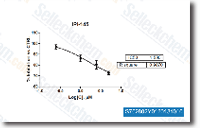Numerous retrospective case management research in Korea have supported chemopreventive results of gin seng that seems to exert a broad spectrum of anti tumor routines in humans. Ginseng is often a deciduous perennial plant belonging for the Araliaceae Ivy family members which has been applied for centuries in China and Korea as an anti inflammatory agent. Ginseng extracts con tain ginsenosides because the significant biologically lively consti tuents, that are glycosides which has a dammarane skeleton. Numerous in vitro research have demonstrated anti tumor effects of ginseng alone or in mixture with anti cancer agents. Antioxidant, anti prolifera tive and anti inflammatory effects of ginseng happen to be recognized that could mediate the anti tumor effects of this herb. Furthermore, ginseng metabolites are proven to inhibit EGFR induced epithelial cell growth.
In addition, a latest study in a model of colitis associated colon cancer showed that ginseng decreased ranges of phospho lively EGFR and phospho active ErbB2 as well as ERK, a down stream effector of EGFR, indicating ginseng could suppress EGFR signals in colonic tumorigenesis. Offered the requirement AZD1080 GSK-3 inhibitor for EGFR in tumor promotion by Western food plan, in the cur lease review we investigated the capability of ginseng extract to inhibit colonic tumorigenesis under disorders of Western dietary pressure. Tumors have been induced with azox ymethane followed by dextran sulfate sodium. Azoxymethane is often a professional carcinogen that is definitely meta bolized while in the liver and additional metabolized while in the colon to an active alkylating agent, presumably a methyl automobile bonium ion.
This methyl donor leads to guanine methylations and sooner or later G to A transitions. Proto oncogenes targeted by AOM include things like activating mutations in b catenin and K Ras. DSS is often a polysul fated polymer that arrests colonic crypt cell re genera tion resulting in acute mucosal ulceration and clinical colitis that enhances purchase MP-470 tumorigenesis. A number of research have identified quite a few bacterial metabolites of ginseng with biological routines. These incorporate 20 O b twenty proto panaxadiol or compound K that induces apoptosis in colon cancer cells. Because the microbiome is vital for compound K generation, we examined the effects of dietary ginseng on microbial diversity and results of broad spectrum antibiotics on compound K bioavailability. Various ginsenosides are already shown to inhibit cancer development, such as colon cancer cells in tumor xenograft models.
To right test compound K anti tumor exercise in colon cancer, we also examined the effects of this microbial metabolite of ginseng on colon cancer cell development in a tumor xeno graft model. Taken  with each other, on this examine we demonstrate for that very first time that ginseng can inhibit irritation asso ciated colonic tumorigenesis in mice fed a tumor pro moting Western diet.
with each other, on this examine we demonstrate for that very first time that ginseng can inhibit irritation asso ciated colonic tumorigenesis in mice fed a tumor pro moting Western diet.
Jakenzyme
Biological groups is various
